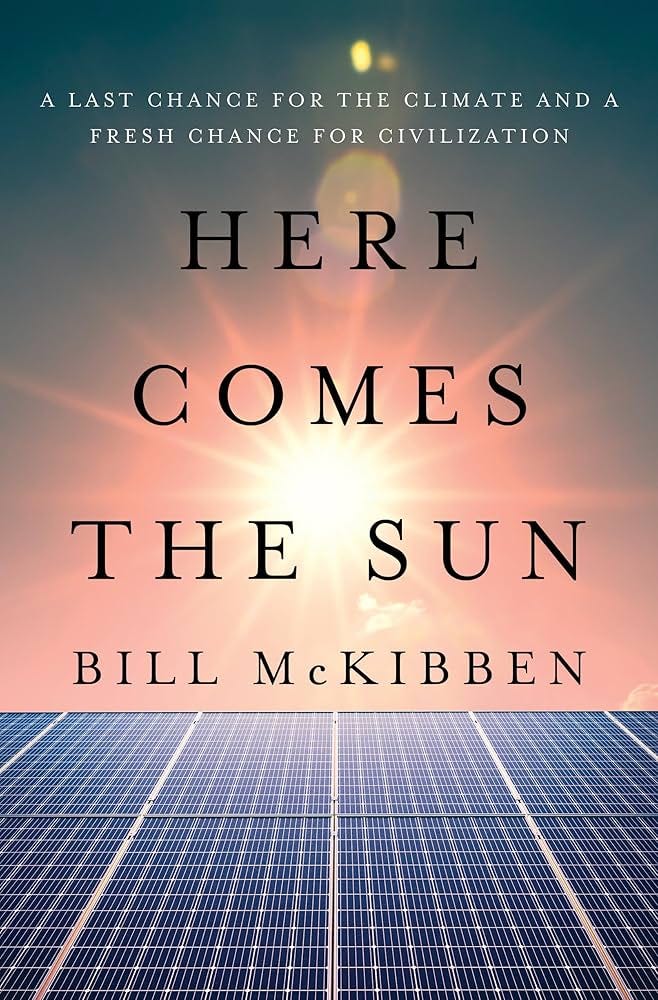I’ve been tracking electricity lately — the growing demand, the stress on the grid, the race to build clean infrastructure fast enough. I’m deep into producing a story for the PBS News Hour about the surge in demand from AI data centers, electric vehicles, and heat pumps, and whether our creaky grid can keep up.
That’s what led to a fascinating conversation with Bill McKibben, whose new book Here Comes the Sun: A Last Chance for the Climate and a Fresh Chance for Civilization couldn’t have landed at a more pivotal moment.
McKibben has been sounding the climate alarm longer than most of us have been listening. But this book feels different — hopeful, defiantly so. He argues that we finally have the tools to fight back against the climate crisis: cheap solar panels, wind turbines, and batteries.
“Finally, finally, finally — after 35 years — we have a scalable weapon in the fight against climate change,” he told me. “We live on a planet now where the cheapest way to produce energy is to point a sheet of glass at the sun.”
The question is: will we deploy those sheets of glass fast enough to save civilization before it’s too late?
Certainly not if the fossil-fueled Trump administration gets its way. The cash-rich coalition of oil, gas, and coal interests behind this White House seems intent on transforming the U.S. into a kind of energy museum — a Colonial Williamsburg of Combustion. Step right up to Tailpipe World — see how your ancestors powered their society!
From Reporter to Advocate
McKibben began his career as a staff writer at The New Yorker in the 1980s. His 1989 book The End of Nature was the first widely read popular account of global warming — a call to action as seminal as Rachel Carson’s Silent Spring or Upton Sinclair’s The Jungle. Like those authors, McKibben evolved from chronicler to crusader, from reporter to reformer.
He went on to found 350.org, one of the world’s most influential climate advocacy groups, and later Third Act, which mobilizes older Americans to push for climate action.
“There’s no more important task that humans could set themselves to than limiting the rise in the planet’s temperature over the decades to come,” McKibben told me.
The Power Problem Solved?
In Here Comes the Sun, McKibben pivots from despair to optimism.
“It really is astonishing to imagine that after 700,000 years of setting things on fire, humans are now at a point where, just in purely economic terms, we’d be far better off relying on that large ball of burning gas 93 million miles up in the sky.”
But the U.S. is at a crossroads — and seems determined to turn onto a dead-end. Grid demand is exploding, yet oily politics is throttling the clean technologies that could meet it.
Take offshore wind. The Trump administration has canceled more than 3.5 million acres of wind-energy lease zones and revoked funding for several large projects. In September, it even pulled the plug on Revolution Wind — the 810-megawatt project off Rhode Island and Connecticut that was already 80% complete.
(You can see my News Hour report on that here:)
(After that piece aired, a federal judge lifted the stop-work order, and construction resumed.)
Then there’s Esmeralda 7, a massive solar-and-storage complex in Nevada that would have been the largest of its kind in the nation — until a Bureau of Land Management diktat killed the environmental review. Meanwhile, the Trumpistes are flinging open public lands and waters for oil and gas drilling. Drill, baby, drill — oy.
These are not just policy reversals; they’re market signals. If renewable projects can’t get built even after years of permitting and investment, how do we ever scale up to meet tomorrow’s demand?
Renewables: Realistic and Ready
The dirty little secret — which the fossil crowd would rather you didn’t know — is that solar, wind, and battery storage are now the cheapest and fastest-to-deploy energy sources on Earth.
“It’s cheap, it’s available in bulk, it’s on the shelf, ready to go,” says McKibben. “And that’s a huge threat if you own an oil well or a coal mine.”
The old knock on renewables — that they’re intermittent — has reached its, uh, storage limit. Indeed, storage technologies, from lithium-ion to long-duration systems, are improving at a stunning rate. During the second quarter of 2025, U.S. utility-scale storage added 4.9 gigawatts — a 63% year-over-year increase — while residential systems rose 608 megawatts. Solar and wind with storage can now be considered dispatchable, providing reliable, around-the-clock power.
Demand Meets Disruption
Setting aside the question of whether the AI boom is another dot-com bubble in disguise (anyone smelling Tulips here?), OpenAI’s Sam Altman has predicted that artificial intelligence could soon consume a “staggering” fraction of the planet’s power. He estimates his company alone could need 250 gigawatts of data-center capacity by 2033 — roughly one-third of current U.S. peak power consumption.
Is it even possible to put 250GW of wind and solar on the US grid in short order? Yes. Just last year, China installed a record 80 GW of wind and 277 GW of solar capacity - a 45% increase from the previous year.
This is where McKibben sees a possible silver lining: if frothy market forces prevail over political obstruction, the resulting green infrastructure boom could supercharge a clean-energy revolution.
“We could end up with a grid that powers heat pumps, induction cooktops, EVs, and e-bikes,” he told me. “Stuff that’s probably, in the end, of considerably more value than helping your kid cheat at their homework.”
McKibben’s arc — from journalist to activist, from despair to hope — mirrors the moment we’re living through. The opponent now isn’t just Big Oil; it’s the inertia of an entire civilization built on combustion.
That sun is rising. Whether we turn toward it — or hide in the shadows of fossil fuel nostalgia — is the existential choice before us.
Keywords: Bill McKibben · Here Comes the Sun · climate change · renewable energy · Revolution Wind · Esmeralda 7 · Nevada solar-storage · PBS NewsHour · Miles Ahead · Miles O’Brien · AI electricity demand · solar power · wind power · grid infrastructure · fossil fuel rollback










